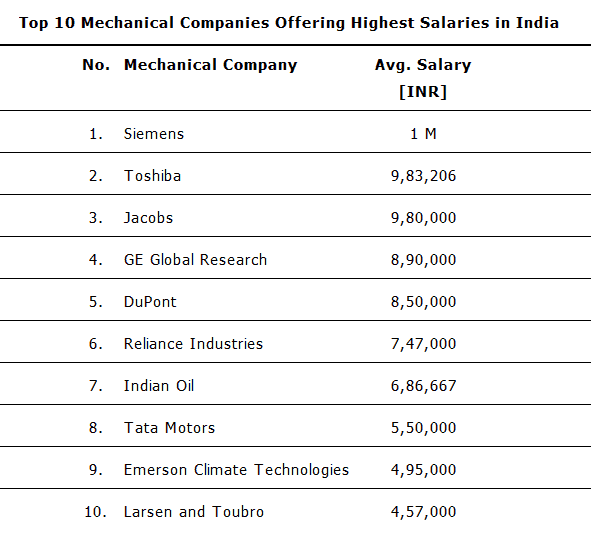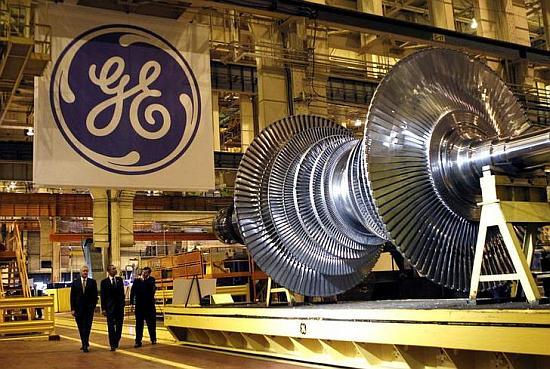 | « Back to article | Print this article |
Mech Engineers: 10 organisations that pay the most
In the second of a series exploring the companies that offer the best remuneration in a given sector, we bring you the best mechanical engineering companies from India that offer a handsome remuneration.
Machines are an integral part of life today. Knowingly or inadvertently we use one type of machine or the other each and everyday in various ways.
Mechanical engineering is a branch of engineering that deals with physics and material science.
The principles of these two sciences are applied together in order to design, produce, maintain, and analyse several mechanical systems.
To be a mechanical engineer you will have to have a strong grasp on various concepts including mechanics, thermodynamics, kinematics, material science, and structural analysis.
When these principles and tools such as computer aided engineering and product life cycle management are used together, cooling and heating systems, transportation systems, aircrafts, watercrafts, robotics, and medical devices may be designed as well as analysed.
All over the country there are plenty of mechanical companies to apply to. However, if you want to work at one of the best companies you will need to have a degree from a reputed college with commendable grades.
Fresher candidates are usually recruited in top companies in India through campus placements.
Walk-in interview is also an option.
However, to be recruited through either of these pathways you should have performed very well in your academics with a passion for mechanical engineering.
Once you gain some experience you can apply to a better company for a better job in the category that you are a specialist.
You should note that the competition to bag the best mechanical job in India is fierce but you should also not forget that mechanical engineers have more scope when it comes to placements especially when compared to the other engineering branches.
The doors of many sectors, both private and government, are open for mechanical engineers.
You can choose to be in pharmaceuticals or the automobile industry or any other industry for that matter. Plus, the demand is so much that the salary offered by many mechanical companies is highly lucrative.
Please click NEXT to continue reading...
'A student from IIT will be given more compensation than a student from any other college'
The private sector
In the private sector, you can expect more income when compared to the government sector.
In this sector, the institution from where you pursued your under-graduation will hold a lot of importance along with your grades.
For example, a student from the IITs will be given more compensation than a student from any other college.
Most companies recruit candidates through campus placements and then train them to fit their requirements.
Campus placement is the best and easiest way to bag a job at a top company.
As a fresher, you may join as an engineer or a trainee based on the requirement and the skills you possess.
Major industries in the private sector to check out for lucrative pay include:
- Chemical and pharmaceuticals industry
- Oil and gas industry
- Automobile industry
- Power and energy industry
- Construction industry
A fresher can expect salary in the following range:
- IIT mechanical engineer: 30,000 INR to 60,000 INR per month
- BE/BTech mechanical engineer: 15,000 INR to 28,000 INR per month
- Diploma mechanical engineer: 10,000 INR to 15,000 INR per month
'The increment is quite slow and small in the government sector'
The government sector
While a government job is considered safe and secure, which is why many people opt for it, you should know that you couldn't expect hefty pay even if you have graduated from the IITs.
In the government sector, the pay scale is fixed regardless of your graduation school.
A fresher can join either as an assistant engineer or a junior engineer.
You can expect anything between 12,000 INR and 20,000 INR to begin with.
The increment is quite slow and small in the government sector.
Note that upon successfully getting selected for IES or Indian Engineering Services, you will be able to earn around double the average salary offered to mechanical engineers in the government sector.
Popular industries in the government sector that offer high salaries include:
- State government (engineering division)
- Indian Railways/Metro Rail
- Indian Defense Services
- Government power and energy organisations
- Public sector undertakings (PSU)
Click NEXT to find out the annual remuneration of mechanical engineers in the top mechanical firms in the country.
How much do mechanical engineers earn?
The list below indicates the average annual salary of a mechanical engineer (calculated by integrating the salaries of all mechanical engineers in a given organisation and dividing it by the number of engineers in the organisation) in the respective companies.




